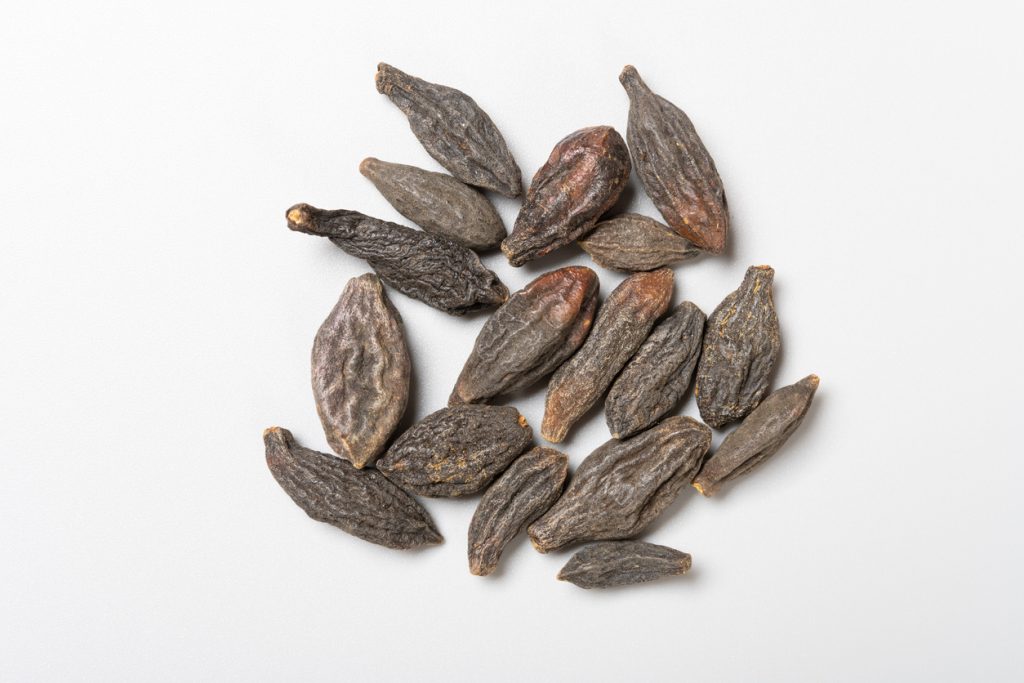Chinese White Olive (Qing Guo)

What is Chinese White Olive (Qing Guo)?
Chinese White Olive (qing guo, 青果) , also known as Fructus Canarii, is the ripe fruit of Canarium album, an evergreen tree belonging to the family Burseraceae. Canarium album is a famous subtropical fruit tree that is native to Southern China, and has at least 2000 years of cultivation history.
Found in China, Japan, Vietnam, Laos, Cambodia, Thailand, Myanmar, India, and Malaysia, Canarium album has many medicinal and commercial uses. Chinese White Olive was first recorded in Ri Hua-Zi’s Collected Materia Medica (Ri Hua Zi Ben Cao, 日华子本草) during the Five Dynasties and Ten Kingdoms (907 AD – 979 AD). Other than being used to make items such as furniture, farm tools and construction materials, its ripe fruits are gathered every autumn for medicinal usage.
In addition, Chinese White Olive is also eaten as food, and used as an ingredient in Southeast Asia dishes such as Khao phat nam liap.
In Traditional Chinese Medicine (TCM), Chinese White Olive falls under the category of ‘Herbs that clear Heat and relieve toxicity’. Such herbs are used to clear inflammatory and infectious conditions, referred to as Internal Heat in TCM. Neutral in nature, Chinese White Olive does not affect the yin-yang balance in your body.
Sour and sweet in taste, Chinese White Olive can aid digestion and restrain abnormal discharges of fluids from the body, such as diarrhea or heavy sweating. The herb can also slow down acute reactions, detoxify the body and has a tonic effect on the body by replenishing qi and blood. In particular, Chinese White Olive targets the stomach and the Lungs.
Functions and Benefits of Chinese White Olive (Qing Guo)
Traditional Chinese Medicine (TCM) shows that Chinese White Olive has the following health benefits.
Chinese White Olive can clear Heat, resolve toxicity, and promote the generation of fluids. This helps to relieve sore throat caused by the invasion of Wind-Heat or the accumulation of Heat toxins, dry or parched mouth, irritated throat, thirst, hoarseness, cough with sticky sputum, epilepsy, polydipsia, hematemesis with coughing and bacillary dysentery. Chinese White Olive can relieve alcohol intoxication and pufferfish poisoning as well.
Modern studies suggest that Chinese White Olive may be a supplementary food to prevent diabetes and its complications. Containing properties that promote mitochondrial functions and glucose uptake, this herb acts as an antioxidant and anti-glycation agent which has the potential to prevent diabetic complications.
High in dietary fiber content, Chinese White Olive may aid weight management by promoting weight loss, improving the body’s response to insulin and lowering blood pressure levels. Such fiber also helps to slow down the rate of fat absorption and reduce hunger. Possessing anti-tumour proliferative effects and functional compounds, Chinese White Olive exhibits anticancer activity as well.

How to Use Chinese White Olive (Qing Guo)
The recommended daily dosage of Chinese White Olive is 6 – 12g, when used as a decoction, paste or pills.
If used externally, you can pound Chinese White Olive into powder to sprinkle over the desired area, or apply with oil.
Chinese White Olive and Chinese White Olive supplements may be found in herbal stores and Asian specialty markets.
Cautions and Side Effects of Chinese White Olive (Qing Guo)
Chinese White Olive should not be used by individuals who are experiencing early stages of exterior syndromes or constipation.
Do note that excessive consumption of Chinese White Olive may cause sore throat, nausea, vomiting, and trigger pox or acne.
We strongly encourage you to consult your healthcare provider before deciding to add Chinese White Olive to your healthcare routine.
Summary
Here is a summary for Chinese White Olive (Qing Guo):
- Herb name (Chinese): 青果
- Herb name (Pin Yin): qīng guǒ
- Herb name (English): Chinese White Olive
- Herb name (Botanical): Fructus Canarii
- Origin of species: Canarium album Raeusch.
- Part(s) of herb used: Fruit
- Geo-specific habitat(s): Guangdong, Guangxi, Fujian, Yunnan, Sichuan
- Taste(s) & Properties: Sweet, sour; Neutral; Administrates the Lung and Stomach Meridians
- Actions: Eases throat irritations, coughs and constant thirst; Helps to neutralise effects triggered by the naturally occurring irritants in seafood
References
He, Z., Xia, W., Liu, Q., & Chen, J. (2009). Identification of a new phenolic compound from Chinese olive (Canarium album L.) fruit. European Food Research and Technology, 228, 339-343.[Accessed on 5th February 2023]
Li, J., Wang, R., Wang, Y., Zeng, J., Xu, Z., Xu, J., & He, X. (2022). Anti-inflammatory benzofuran neolignans from the fruits of Canarium album (Chinese olive). Journal of Agricultural and Food Chemistry, 70(4), 1122-1133. [Accessed on 5th February 2023]
Liu, H., Qiu, N., Ding, H., & Yao, R. (2008). Polyphenols contents and antioxidant capacity of 68 Chinese herbals suitable for medical or food uses. Food research international, 41(4), 363-370. [Accessed on 5th February 2023]
Xiang, Z., & Wu, X. (2017). Chemical constituents of Chinese white olive. Pharmaceutical Chemistry Journal, 51, 465-470. [Accessed on 5th February 2023]
Share this article on
